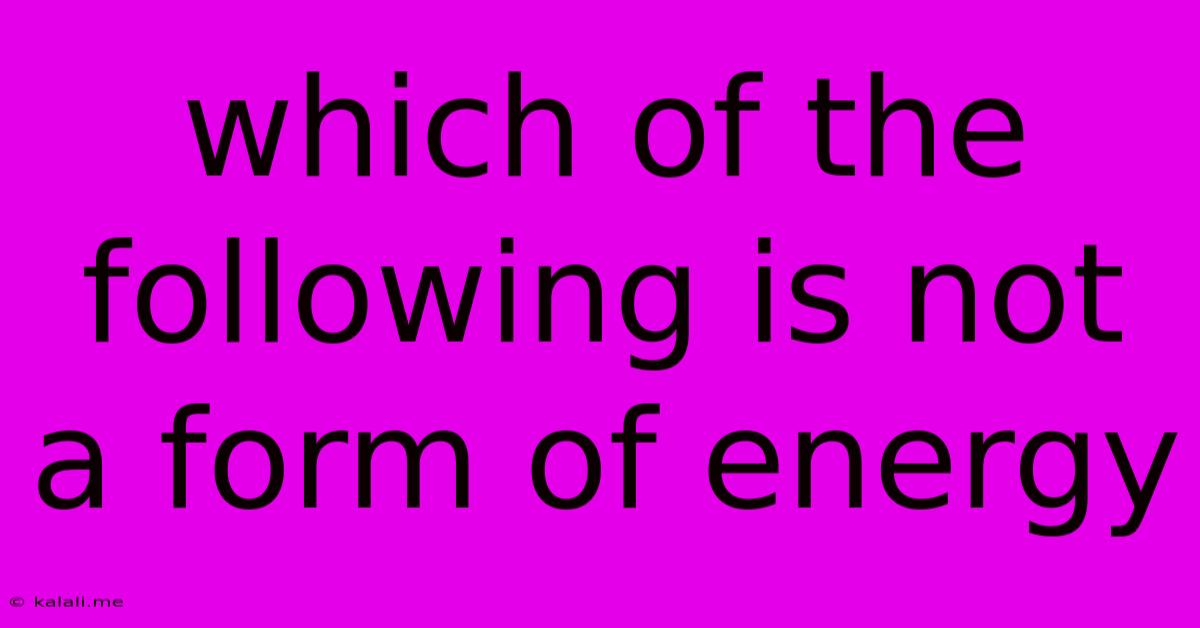Which Of The Following Is Not A Form Of Energy
Kalali
Jun 15, 2025 · 3 min read

Table of Contents
Which of the Following is NOT a Form of Energy? Understanding Energy Types
This article will explore the fundamental concept of energy and differentiate between various forms. We will then identify what is not a form of energy from a given list (which you will need to provide for a complete answer). Understanding energy types is crucial in various fields, from physics and engineering to everyday life. This guide will help clarify common misconceptions and strengthen your comprehension of this critical scientific principle.
What is Energy?
Energy, in its simplest form, is the capacity to do work. This work can manifest in many ways, leading to the diverse forms of energy we observe in the universe. It's a fundamental property of the universe, neither created nor destroyed, only transformed from one form to another (the principle of conservation of energy).
Common Forms of Energy
Many forms of energy exist, and they often interconvert. Some of the most common include:
-
Kinetic Energy: The energy of motion. Anything that moves possesses kinetic energy, from a speeding car to a flowing river. The faster the object moves, the greater its kinetic energy.
-
Potential Energy: Stored energy due to an object's position or configuration. A stretched rubber band or water held behind a dam possess potential energy. This energy is released when the object changes its position or configuration, often transforming into kinetic energy.
-
Thermal Energy (Heat): The energy associated with the random motion of atoms and molecules. The higher the temperature of an object, the greater its thermal energy.
-
Chemical Energy: Stored within the chemical bonds of molecules. Burning wood releases chemical energy in the form of heat and light. Food also contains chemical energy that our bodies utilize.
-
Nuclear Energy: Released from the nucleus of an atom during nuclear fission or fusion. This is an extremely powerful form of energy, harnessed in nuclear power plants and evident in the sun's energy production.
-
Radiant Energy (Electromagnetic Radiation): Energy that travels in the form of waves, such as light, radio waves, and X-rays. The sun is a primary source of radiant energy.
-
Electrical Energy: The energy associated with the flow of electric charge. This powers our homes and devices.
-
Sound Energy: Energy carried by sound waves. It's a form of mechanical energy.
Identifying Non-Energy Forms
To accurately answer "Which of the following is NOT a form of energy?", you need to provide the list of options. However, here are examples of things that are not forms of energy:
-
Mass: While mass and energy are related through Einstein's famous equation (E=mc²), mass itself is not a form of energy. It represents the amount of matter in an object.
-
Temperature: Temperature is a measure of the average kinetic energy of particles in a substance, not a form of energy itself.
-
Force: Force is an interaction that can cause a change in an object's motion, but it's not a form of energy. It's the cause of energy transfer, not energy itself.
-
Pressure: Similar to force, pressure is a measure of force per unit area, not energy.
-
Information: While information can be encoded and transmitted using energy, the information itself is not a form of energy.
By understanding the fundamental definition of energy and the various ways it manifests, you can confidently identify what constitutes energy and what doesn't. Remember to consider the capacity to do work when classifying a phenomenon as a form of energy. Provide the list of options, and I can definitively answer your question.
Latest Posts
Latest Posts
-
Air Is Released From A Balloon
Jun 15, 2025
-
How To Print Admission Ticket For Sat
Jun 15, 2025
-
Is Square Root Of 6 A Rational Number
Jun 15, 2025
-
Which Of The Following Is Not Organic
Jun 15, 2025
-
Convert 1 Cubic Foot To Gallons
Jun 15, 2025
Related Post
Thank you for visiting our website which covers about Which Of The Following Is Not A Form Of Energy . We hope the information provided has been useful to you. Feel free to contact us if you have any questions or need further assistance. See you next time and don't miss to bookmark.